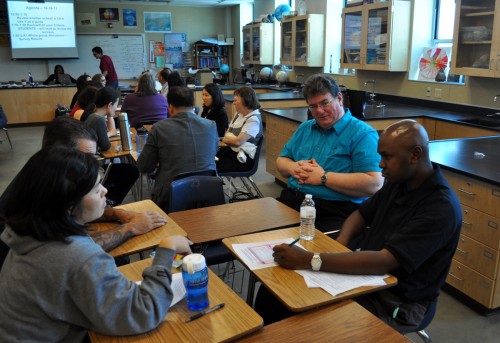AHS Anticipates Arrival of Accreditation Committee: What to Expect from the Process

JOHNNY HUYNH
SARAH TAKHAR
Staff Writers
A competitive spirit that yearns for approval is a trait of an excelling school. AHS holds an example of this trait, especially when it comes to gaining accreditation from the Western Association of Schools and Colleges (WASC). This year, WASC will be paying AHS a visit to check up on AHS’ progress in the goals that the school made three years ago.
•What is WASC accreditation?
WASC has six accrediting bodies all across America, including American-held territories. It is a program that schools sign up to join. WASC conducts occasional investigations in order to assure quality in educational institutions.
Although it is not mandatory for all schools to partake in the WASC program, colleges tend to favor those that are involved. The accreditation provides evidence that a school knows how to maintain and sufficiently teach students the material they need to know.
•How does WASC accreditation work?
Every three or six years, WASC sends two to six representatives to WASC-enrolled schools to see if the schools have made the progress and improvements that they previously promised.
If there are areas that can be easily improved in the school, WASC will visit three years later to see the changes made. However, if the issues need more attention, the committee will come six years later to see if they have been resolved or improvements have been made.
“I believe that our school, by being involved with WASC, is a good thing, as it helps those who go to college; it gives our graduation diploma meaning,” senior student collaborator Justin Baeza said.
•How has this been affecting AHS?
For AHS, this accreditation bears a significance that greatly helps the school’s reputation, especially in the eyes of college admission.
AHS has been with the WASC program for a while and has improved in various areas over the last six years.
•What are the goals of this program?
When the WASC committee last visited AHS three years ago, the school made several goals: to develop and implement a system of formative standards-based instruction, receive more student evaluations and gradually improve on weak points. One of the solutions regarding academic performance is to work on students’ learning skills by utilizing different teaching skills.
•When will the WASC committee visit AHS?
The WASC committee will send two representatives to come in March 2012 for one week. During their visit, the representatives will be walking around campus and visiting random classrooms to observe the teaching environment in its natural state.
•How do students play a role in this process?
WASC relies on student contributors during the review process. In addition to academic performance, the committee addresses issues regarding overall morale and opportunities provided to students.
Once in a while, students may encounter one of their officials observing their class in action. Needless to say, there is nothing for students to be nervous about.
“Students in WASC are allowed to express both their concerns and positive experiences which they have had at Alhambra High. It is really not a frightening experience. The few days WASC will be at our school is a chance to display our wonderful campus and the pride Moors have,” senior Daniel Ibarra, another student collaborator, said.
•What changes has WASC helped implement at AHS?
One positive change has taken place within the special education program.
Previously, special education students were placed in separate classes according to their needs. Integrated classrooms are now available for them to learn in so they can interact with other students as well.
AHS has also improved in academic achievement. Since 2007, AHS has been steadily closing its achievement gap in areas such as Literature, Geography and SAT scores.
In the past, AHS students only had 10% of the students raising their scores. That 10% has grown to around 20% within the past four years.
“Slow and steady wins the race. [Though we have taken a while to get] to the point we’re at, it’s okay because we are improving,” Principal Brad Walsh said.